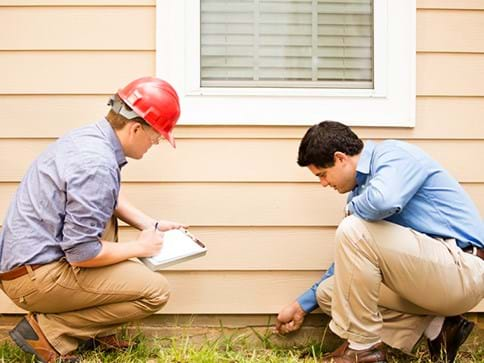If you’re reading this, you’re probably aware of a pre-purchase building inspection. It’s a service performed by a professional home inspector who evaluates a house’s condition and reports any problems to the potential buyer.
However, you may be wondering if a building inspection applies to new homes as well. You’ve taken the time to research the area, consult with a real estate agent, and viewed your newly-built house personally. There are no obvious problems, so why waste money on an inspection?
Unfortunately, unless you’re an experienced contractor or are up to date with building regulations, it’s difficult to spot potential problems with a new home. Even if everything appears fine on the surface, there could be issues with the wiring, plumbing, or foundation that are not apparent to the untrained eye.
New Homes Aren’t Free of Defects
New homes require staged inspections during construction and must be approved by a building certifier. This must comply with local council regulations and the building code of Australia. Sounds like a lot of checks, right? Not quite.
Even with these measures in place, new homes aren’t perfect. While a building certifier enforces code compliance, they don’t check poor craftsmanship or inferior materials that could affect the home’s longevity. For example, a new home might be built with substandard wiring. This may not pose an immediate danger, but it’s a problem that will need to be addressed down the road.
Why are Mistakes Made During Construction?
From incorrect frame construction on your roofs to major structural defects in your walls, builders will occasionally make mistakes when constructing new homes.
There are many reasons for this, but the most common one is that they’re rushed to meet deadlines. In some cases, builders are given unrealistic timelines by developers and are forced to cut corners in order to make up for lost time.
Other reasons include budget constraints, poor communication, and inexperience.
These errors can have serious repercussions, so it’s important to have a new home inspected before you move in. For instance, if there are any issues with the foundation, they can lead to significant problems down the line, such as cracks in walls, doors and windows not closing properly, and uneven floors. Addressing these problems early on can save you time, money, and stress in the long run. To better understand the potential issues that may arise and the solutions available, consider visiting this comprehensive guide on foundation repair. This resource will answer common questions about foundation repair and basement waterproofing, helping you make informed decisions when it comes to protecting your new home investment.
Why to Hire an Licensed Building Inspector for a New Home
An independent, professional building inspection can uncover all sorts of issues related to workmanship, materials, and code compliance. An independent property inspector will test all the home’s systems, from plumbing to HVAC whilst identifying potential safety hazards, substandard materials and major structural issues.
You’ll then be provided a building report by your independent property inspector, which must comply with Australian Standards (AS: 4349). These standards define what a defected item is, and how severe the defect must be to be classed as a ‘major defect’.
Overall, you’ll have peace of mind and new insights into your home by opting for a building inspection, even if it’s brand new. It could potentially cost thousands of dollars in repairs and give you the chance to renegotiate the purchase price.
What About My House Builder’s Warranty?
Most new homes come with a structural guarantee or warranty provided by the builder. And while compensation is typically given for defects, it’s not as cut and dry as you might think.
Builder warranties will vary depending on the company, and your new home’s features. On average, warranties will last between six months and two years, covering materials, HVAC, electric, and plumbing systems, as well as the home’s structure.
While this might seem like a good safety net, there are several caveats. First, if it’s at the minimum end of the spectrum (6 months), any structural defects that occur just outside the warranty period won’t be covered.
Second, some builders will not cover anything that isn’t classified as code violations, usually including poor workmanship and materials. These problems may not arise until long after you’ve moved in and might not be apparent until extensive damage has been done.
Founder of Mortgage Pros, William Thai, recommends that homeowners and property investors always get a building inspection, even if a builder’s warranty covers their home.
Common New Home Defects Your Inspector will Help
Defects caught by an independent building inspector are categorised into two types: patent and latent.
Patent
This kind of defect can be easily discovered and seen with the naked eye during your standard home inspection. A patent defect is based on the legal principle, “let the buyer beware” and is, therefore, the responsibility of the buyer to catch. As such, if a buyer hasn’t bothered to inspect the property and patent defects are later discovered, the seller has no legal obligation to fix them.
For example, if there’s a hole in the wall, that would be considered a patent defect. Another example is if the inspector finds that the door’s hinges are loose and about to fall off.
Latent
A latent defect is not so visible, and generally isn’t caught unless a specialist is brought in to have a look. As these defects can’t be seen at first or even second glance, the principle of “let the buyer beware” doesn’t apply. If a latent defect is discovered after you’ve moved in, the seller may be held liable and required to pay for repairs.
An example of a latent defect is if a leaking pipe is hidden behind the walls or if there’s mould growing in the attic that’s not visible from the outside. A qualified building inspector will be able to identify these sorts of problems and more.
How Do I Use My Building and Pest Inspection Report?
Hiring a professional home inspector is essential when buying a new home. For a relatively small fee, building inspectors can uncover all issues related to workmanship, materials, and code compliance. All details will then be provided in a building inspection report.
The information is invaluable as it can help buyers gain leverage during negotiations with the seller, generally leading to a lower purchase price. In some cases, it might even allow you to back out of the deal entirely or even push the seller to make all the necessary repairs before closing.
Of course, the most important reason to get a new home inspection is for your own peace of mind. At the end of the day, you’ll be the one living in the house and you’ll want to make sure that it is safe, structurally sound, and up to building codes.
When a Building and Pest Report isn’t Necessary
Are there circumstances where a building report wouldn’t be useful? Very rarely. However, there are a few reasons you might not want to bother:
- You’re buying a house that’s going to be demolished. There’s little point in evaluating the property if it’s going to be torn down.
- You intend to proceed with major renovations anyway. This is common among people who intend to flip a house or those who are buying a fixer-upper. In this case, it might make more sense to get an inspection if you’ve already started work on the property.
- The seller has already had a building inspection done and they’re willing to provide you with a copy. This could be for marketing purposes and to remain transparent throughout the entire process.
While these are all valid reasons not to get a report, in most cases, it’s still a good idea to have one done. It never hurts to be extra careful when making such a large purchase.
What about Pest Inspections for a New Home?
If you think pests don’t cause problems for new homes, think again. Poorly constructed homes can provide the perfect environment for all sorts of critters, from rodents and wood destroying insects known as carpenter ants and termites.
Even if a new home passes initial inspections by a builder, it’s notoriously difficult to spot pests as they’re often hidden away in hard-to-reach places. This is why pest inspections need to be carried out by a qualified pest inspector. Alternatively, you could have a building and pest inspection, covering both in one go.
A pest inspection does an entire sweep of the building, identifying the telltale signs of infestation and damage. For example, carpenter ants leave behind wood shavings, while termites leave behind Mud Tubes. This information can then help you rectify the problem by calling in a pest control company.
Understanding the Tax Implications of New Home Inspections
When considering a building inspection for your new home, it’s also crucial to understand the potential tax implications. This aspect is often overlooked but can have significant financial consequences. For instance, if you’re purchasing the property as an investment, the building inspection cost may be tax-deductible. This is because it’s considered an expense incurred in the process of generating rental income.
Get a Building Inspection with Sidepost
If you’re thinking about buying a new home, don’t hesitate to contact Sidepost. We offer new building inspections across Australia, servicing every city and suburb particularly Melbourne, Sydney, Canberra and Gold Coast. Other than that, we also provide pre-purchase inspections and asbestos testing.
Our team of certified professionals will conduct a thorough property examination, inside and out. We’ll check for obvious defects, as well as any hidden problems that’s deliberately concealed. Once the inspection is complete, we’ll deliver a detailed report, highlighting any areas of concern.
We also provide building and pest reports, ensuring that your new home is free of any nasty surprises. To learn more about our services or to book an inspection, get in touch with Sidepost’s building inspectors today and we’ll be happy to assist you.
Air Conditioning ( 3 )
Blinds installation ( 3 )
Building and Pest Inspections ( 4 )
Car Detailing & Car Wash ( 3 )
Carpet Cleaning ( 3 )
Carpet Installation ( 2 )
Custom Fish Tanks ( 2 )
Dry cleaning and ironing ( 3 )
Fencing Contractors ( 5 )
House Cleaning ( 7 )
House Painting ( 6 )
Ironing Service ( 1 )
Lawn Mowing ( 3 )
Pest control ( 2 )
Pool cleaning/servicing ( 3 )
Pressure Washing ( 2 )
Uncategorized ( 6 )
Professional Home Services at your Door
Get it all done with Sidepost - House cleaning, fencing, painting, and more.


